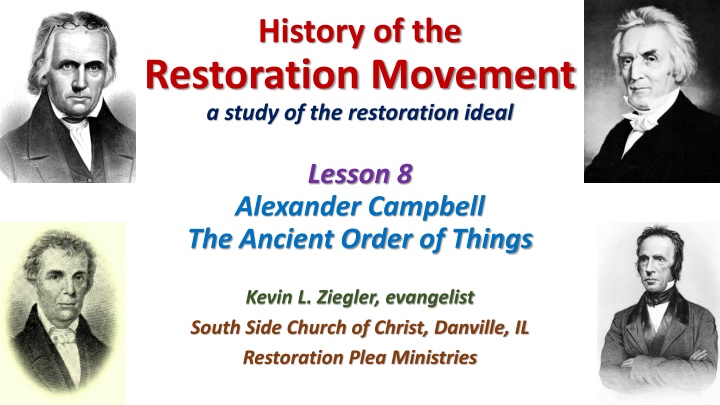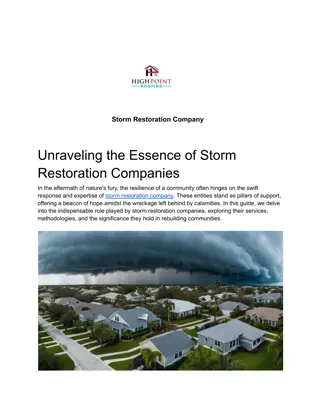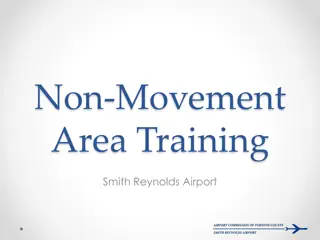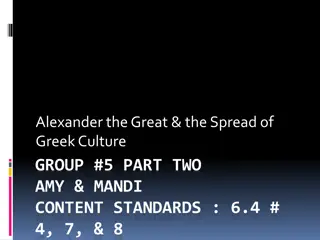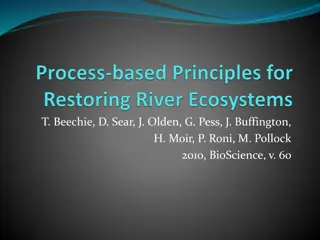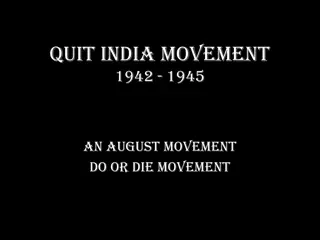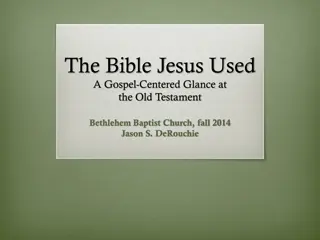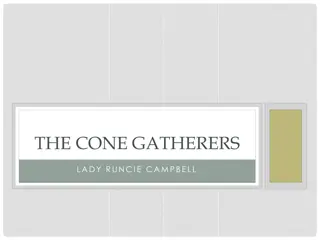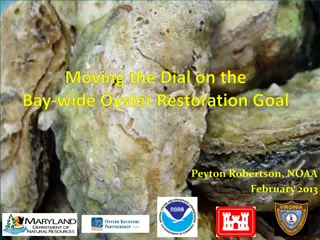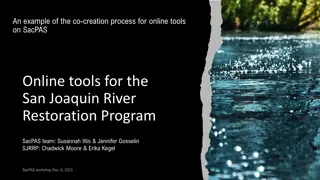Alexander Campbell - Leader of the Restoration Movement
Alexander Campbell, an influential figure in the Restoration Movement, was known for his oratorical skills, debates, and writing. This study delves into his life, from his early years in Ireland to his impactful periods in America, highlighting his significant contributions to the movement. Campbell's resilience and dedication to restoring ancient Christian practices shaped the course of religious history in the United States.
Download Presentation

Please find below an Image/Link to download the presentation.
The content on the website is provided AS IS for your information and personal use only. It may not be sold, licensed, or shared on other websites without obtaining consent from the author.If you encounter any issues during the download, it is possible that the publisher has removed the file from their server.
You are allowed to download the files provided on this website for personal or commercial use, subject to the condition that they are used lawfully. All files are the property of their respective owners.
The content on the website is provided AS IS for your information and personal use only. It may not be sold, licensed, or shared on other websites without obtaining consent from the author.
E N D
Presentation Transcript
History of the Restoration Movement a study of the restoration ideal Lesson 8 Alexander Campbell The Ancient Order of Things Kevin L. Ziegler, evangelist South Side Church of Christ, Danville, IL Restoration Plea Ministries
Outline of Class Lesson 1 What is meant by Restoration Movement and Why it Needs to be Taught Lesson 2 Restoration as a Biblical Principle Lesson 3 Restoration Movement before America Lesson 4 What made America Ready for the Restoration Movement? Lesson 5 Early Attempts at Restoration in America Lesson 6 Barton W. Stone Consistent with the Word of God Lesson 7 Thomas Campbell Speaking Where Scriptures Speak Lesson 8 Alexander Campbell the Ancient Order of Things Lesson 9 Walter Scott the Gospel Restored Lesson 10 Racoon John Smith the Frontier Evangelist Lesson 11 Divisions within the Church Lesson 12 The Restoration Ideal in Today s Church
Alexander Campbell the Ancient Order of Things The importance of Alexander Campbell Came to be the leader of the Restoration Movement, not its founder. Campbell, a "ten-talent" man Campbell drew national attention His oratorical abilities His debates His writing
Alexander Campbell the Ancient Order of Things Five Periods in Alexander Campbell s Life Early life: 1788-1809 Early American experience: 1809-1813 (from his arrival in America to his affiliation with the Redstone Baptist Association) Period of association with the Baptists: 1813-1830 Period of the debates: 1830-1843 Period of organization and construction: 1843-1866
Alexander Campbell the Ancient Order of Things Alexander Campbell Early Life Born in 1788 at Ballymerra, Ireland, where his father taught. His early education was under his father. Campbell was inclined to the outdoor life; athletics, hunting, trapping, rather than to the academic life. Campbell was left in charge of the Rich Hill Academy at age 19 when his father left for America. Campbell took care of his mother and six younger children.
Alexander Campbell the Ancient Order of Things Alexander Campbell First attempt to come to America A smallpox epidemic delayed their departure. The family left for America in October 1808 The ship Hibernia was blown off course and limped into a bay of the Island of Islay. Winds destroyed the ship at anchor (with all on board). The masts were lost be the ship stayed afloat. Campbell sat on one of the stumps of the mast during the storm and contemplated his life. Alexander vowed that if God spared his life, he would dedicate himself completely to the service of God. Islanders rescued the passengers. Alexander was able to save his precious books. He took the family to Glasgow to wait for the spring sailing.
Alexander Campbell the Ancient Order of Things Alexander Campbell Study in Glasgow Alexander decided to spend the winter in study at the University of Glasgow. He was a diligent student, rising at four and retiring at 10. In Glasgow Campbell met the Haldanian teacher Greville Ewing and became a close friend.
Alexander Campbell the Ancient Order of Things Alexander Campbell Study in Glasgow Ewing called for simple New Testament Christianity, although he clung to sprinkling for baptism. Ewing invited the college students into his home for discussion sessions. On Sunday evenings, he preached to 1-2,000 people. Campbell made it a practice to spend Sunday mornings with the Seceder church and attend Greville's preaching in the evening.
Alexander Campbell the Ancient Order of Things Alexander Campbell Break with the Seceder church Influences that had come to bear on Campbell His father's dislike of creed-bound church systems and the desire for unity The philosophy of John Locke The writings of Sandeman The influence of Rowland Hill, James Haldane, Alexander Carson, and especially John Walker. Greville Ewing in Glasgow
Alexander Campbell the Ancient Order of Things Alexander Campbell Break with the Seceder church It was time for the semiannual Communion service at the Seceder church in Glasgow. Campbell has passed the examination and received his token. Campbell stalled, waiting to be among the last group to move to the table. When he could delay no longer, he put his token on the table without partaking and walked out.
Alexander Campbell the Ancient Order of Things Alexander Campbell Trip to America On the ship Latonia, the family landed in New York on Sep. 29, 1809. They took the stagecoach to Philadelphia and a wagon on west. Messages had been sent ahead and Thomas met them on the road on October 19.
Alexander Campbell the Ancient Order of Things Alexander Campbell Trip to America Alexander was afraid to tell his father that he had broken with the Seceder church. Thomas had the drafts of the Declaration and Address in his saddlebags. He was afraid to tell Alexander of his separation from the Presbyterians and the position he was taking as the leader of the Christian Association of Washington. Both were amazed and pleased to find, as they broached the subject, that they were in basic agreement.
Alexander Campbell the Ancient Order of Things Alexander Campbell Early Study Habits One hour a day to Greek One hour to Latin One hour to Hebrew Two hours memorizing 10 verses Reading them in the original language and studying commentaries on them The rest of the time, more than 2 hours, in Church history
Alexander Campbell the Ancient Order of Things Alexander Campbell Early Preaching At age 22 he closed one of his father's sermons with the exhortation, his first attempt at public speaking. First sermon: July 15, 1810 in a private home. He had been neither licensed nor ordained. This constituted a protest against the closed corporation clergy. Alexander was not even a member of a church. Matt. 7:24-27, the parable of the wise & foolish builder. Within a year he had preached 100 times. He never accepted pay.
Alexander Campbell the Ancient Order of Things Alexander Campbell Early Efforts at Unity Thomas and Alexander Campbell made application to the Synod of Pittsburg They desired "to be taken into Christian and ministerial communion." This was not the Seceder group from which he had withdrawn. The primary motive was to make it easier for other members of the Washington Association to retain their church affiliations.
Alexander Campbell the Ancient Order of Things Alexander Campbell Early Efforts at Unity They were rejected by the synod for the following reasons: For affirming that there were opinions in the Westminster Confession that are not in Scripture. For declaring that infant baptism is not taught in Scripture and is a matter of indifference. For encouraging Alexander to preach without a license. For opposing creeds and confessions. Alexander said from the beginning that this effort toward unity would fail. Thomas was optimistic. He was reluctant to be a separatist while pleading for union.
Alexander Campbell the Ancient Order of Things Alexander Campbell Brush Run Church May 4, 1811, the organization constituted itself a church. Brush Run, Western Pennsylvania 30 members The Association members were "burning their bridges. The formation of the Brush Run Church was in reluctant recognition that reform or restoration must come from without, not from within. The church was committing itself to local autonomy. The authority of no synod, presbytery, council, or bishop was recognized.
Alexander Campbell the Ancient Order of Things Alexander Campbell Brush Run Church Members were required to answer the question: "What is the meritorious cause of the sinner's acceptance with God? Two failed to give a satisfactory answer and were rejected, i.e., their acceptance was delayed. These two were later rejected on other grounds. This test question was never used again. Leadership: Thomas Campbell was chosen as elder (monarchial bishop). Alexander was licensed to preach. Four deacons were selected. On the following Sunday, the Lord's Supper was observed, as it was to be observed weekly from that time forward
Alexander Campbell the Ancient Order of Things Alexander Campbell His study of infant baptism Alexander ordered all available books on infant baptism. He became convinced that sprinkling was not practiced in the primitive church. He did not, however, see the need for the "rebaptism" of those members of the Brush Run Church who had been sprinkled as infants. At the birth of his first child in 1812, Campbell was forced to restudy the matter.
Alexander Campbell the Ancient Order of Things Alexander Campbell His study of infant baptism His conclusions: Infant baptism is without biblical command or example. A believer is the only proper candidate for baptism. Immersion is the only mode of baptism in the Bible, and, therefore, to immerse those who had been sprinkled was not rebaptism. He himself had not been scripturally immersed. He himself would be immersed.
Alexander Campbell the Ancient Order of Things Alexander Campbell Baptism of Alexander June 12, 1812, Thomas, Alexander, their wives, and three other members of the Brush Run Church were baptized by a Baptist preacher Elder Luce. They were baptized on the basis of a simple affirmation of faith. Thirteen other members requested immersion at the next meeting. Others followed. Those who did not eventually dropped out of the church.
Alexander Campbell the Ancient Order of Things Alexander Campbell Baptism The design or purpose of baptism was not under discussion at this point; only the mode or method. It was understood, however, that a united church would have to agree on immersion for this and this alone was in the Bible. Immersion brought radical opposition from some of the churches. No longer could Thomas Campbell believe that all churches agreed on the central doctrines of Christianity and that division was only on matters of opinion.
Alexander Campbell the Ancient Order of Things Alexander Campbell Redstone Baptist Association The adoption of immersion brought the reformers into fellowship with the Baptists. Their view of baptism at this time was the same as that of the Baptists. The reformers earnestly desired to see their efforts at union bear fruit, and hope was renewed that they could reform the Church from within. In 1813 the Brush Run Church was willing to join the association provided always that we shall be allowed to teach and preach whatever we learned from Holy Scriptures, regardless of any human creed. This union lasted 17 years in an atmosphere of increasing tension.
Alexander Campbell the Ancient Order of Things Alexander Campbell Sermon on the Law Cross Creek meeting August 1816 Content: Based on Romans 8:3, Campbell demonstrated that the Law of- Moses was superseded by the Gospel of Christ. The old dispensation abrogated, making room for the new, with a new priesthood, worship, day, etc. Significance: A declaration of independence for the Christian Church from the Old Testament Law. Practical conclusions: Infant baptism no longer viewed as an extension of circumcision and rejected. No longer could the Church make binding on believers such things as tithes, observing holy days, fasts, sabbath-keeping, etc. Reactions: The Baptists were alarmed. Alexander's popularity diminished and he was invited less to visit the Baptist churches.
Alexander Campbell the Ancient Order of Things Alexander Campbell Union of Campbell and Stone Movements The Stone movement in Kentucky predated the Campbell movement by almost twenty years. The influence of Campbell in Kentucky was increased by the debates, his personal tours, and the wide-reading of the Christian Baptist. By 1830 The Campbells, and those who followed them, were excluded from the Baptist fellowship. In 1824 Campbell toured Kentucky and met Barton W. Stone and others. At first discussion, their differences seemed irreconcilable, but on closer investigation, they found that their differences were more semantic and imaginary than real.
Alexander Campbell the Ancient Order of Things Alexander Campbell Union of Campbell and Stone Movements Similarities of the Disciples and the Christians The sufficiency of Scripture and the rejection of creeds The character of faith; belief in testimony vs. infused faith Emphasis on unity Rejection of Limited Atonement Believer's immersion for the remission of sins The autonomy of the local church Opposition to sectarian names
Alexander Campbell the Ancient Order of Things Alexander Campbell Union of Campbell and Stone Movements Differences between the Disciples and the Christians The name: Campbell: "Disciples ; Stone: "Christians" The Trinity: Campbell: predominately Trinitarian; Stone: affirmed the deity and pre-existence of Christ but was uncomfortable with the traditional formula for the Trinity as expressed in the Westminster Confession. Immersion as a condition of fellowship: Campbell: immersion a test of fellowship; Stone: did not make immersion a condition of membership in the local church, although almost no one in the Stone congregations were unimmersed. In 1830 Stone admitted the inconsistency of baptizing for the remission of sins and admitting persons to church membership without immersion.
Alexander Campbell the Ancient Order of Things Alexander Campbell Union of Campbell and Stone Movements Differences between the Disciples and the Christians The Lord's Supper: Campbell: Weekly closed communion; Stone: Less frequent open communion. By 1830, however. Stone concluded that the practice of the primitive church was the weekly observance of communion. Evangelistic methods: Campbell: rational evangelism, with the spirit of heartfelt, yet sober persuasion; Stone: More emotional. Stone himself later came around to the Disciples approach, but many of his followers did not.
Alexander Campbell the Ancient Order of Things Alexander Campbell Union of Campbell and Stone Movements The Holiday Conferences; 1831-1832 Lexington, KY January 1, 1832 Barton W Stone and Racoon John Smith were the chief figures Smith: God has but one people on the earth. He has given to them but one Book. and therein exhorts and commands them to be one family. A union, such as we plead for--a union of God s people on that one Book--must, then, be practicable. Every Christian desires to stand complete in the whole will of God. The prayer of the Savior, and the whole tenor of his teaching, clearly show that it is God s will that his children should be united. To the Christians, then, such a union must be desirable. While there is but one faith, there may be ten thousand opinions; and hence, if Christians are ever to be one, they must be one in faith, and not in opinion.
Alexander Campbell the Ancient Order of Things Alexander Campbell Union of Campbell and Stone Movements Smith: For several years past, I have stood pledged to meet the religious world, or any part of it, on the ancient Gospel and order of things, as presented in the words of the Book. This is the foundation on which Christians once stood, and on it they can,' and ought, to stand again. From this I can not depart to meet any man, or set of men, in the wide world. While, for the sake of peace and Christian union, I have long since waived the public maintenance of any speculation I may hold, yet not one Gospel fact, commandment, or promise, will I surrender for the world! Let us then, my brethren, be no longer Campbellites or Stoneites, New Lights or Old Lights, or any other kind of lights, but let us all come to the Bible, and to the: Bible alone, as the only book in the world that can give us all the Light we need.
Alexander Campbell the Ancient Order of Things Alexander Campbell Union of Campbell and Stone Movements Stone: I have not one objection to the ground laid down by him as the true scriptural basis of union among the people of God; and I am willing to give him, now and here, my hand. Smith grasped the Stone s hand and the union was formally made. The two groups extended their hands in fellowship.
Alexander Campbell the Ancient Order of Things Alexander Campbell Union of Campbell and Stone Movements Factors encouraging the merger Prominent people encouraged the union Religious journals encouraged the union Campbell's tours encouraged the union Stone's efforts encouraged the union
Alexander Campbell the Ancient Order of Things Alexander Campbell The Lunenburg Letter (1837) Background Campbell had made a casual reference to Christians in church bodies that did not practice immersion. A devout lady in Lunenburg, VA, criticized him for being too liberal.
Alexander Campbell the Ancient Order of Things Alexander Campbell The Lunenburg Letter (1837) Evaluation Campbell offered this as his opinion, not as Scripture In these early days, it was the congregations of the Stone movement that were in favor of fellowship on an equal basis between the immersed and the unimmersed, not those of the Campbell movement. Campbell was not willing to call a church a New Testament church that compromised the express teaching of Scriptures by admitting the unimmersed into membership. Campbell refused to consider the pious unimmersed as a person who did not need to be taught the way of the Lord.
Alexander Campbell the Ancient Order of Things Alexander Campbell The Debater Campbell-Walker Debate June 1820 Mount Pleasant, Ohio John Walker Seceder Presbyterian Subjects and mode of baptism Campbell printed and sold out 4000 copies This experience taught Campbell the value of putting biblical teaching into writing and led him to begin editing the Christian Baptist
Alexander Campbell the Ancient Order of Things Alexander Campbell The Debater Campbell-McCalla Debate October 15, 1823 Augusta, Kentucky W.W. McCalla Presbyterian Subjects and mode of baptism The debate introduced Campbell to Kentucky. Before the debate Campbell sent no copies of the Christian Baptist into the state. He took copies with him when he went to Augusta for the debate. When the debate ended Campbell had 5,000 new subscribers.
Alexander Campbell the Ancient Order of Things Alexander Campbell The Debater Campbell-Owen Debate April 13-21, 1829 Cincinnati, Ohio Robert Owens Skeptic and socialist Socialism and Christianity Owen simply listed "twelve" supposed truths and restated them over and over throughout the debate. Finally he yielded the floor to Campbell who then spent 12 hours explaining the rationale for Christianity.
Alexander Campbell the Ancient Order of Things Alexander Campbell The Debater Campbell-Purcell Debate January 13, 1837 Cincinnati, Ohio John Purcell Roman Catholic Bishop Catholicism Campbell discussed the papacy's origin and Catholicism's place in church history. Some say Campbell lost this debate. Most reformers, of course, felt he won! The Smith-Jones people in New England felt the debate would make more Catholics. Purcell became Archbishop in 1850.
Alexander Campbell the Ancient Order of Things Alexander Campbell The Debater Campbell-Rice Debate September 15, 1843 Cincinnati, Ohio N.L. Rice Presbyterians Baptism, the Holy Spirit, Creeds The debate began in the building of the Main Street Christian Church on. Campbell's Presbyterian opponent used most of Walker's and McCalla's arguments. Instead of 14 reasons why Baptism and circumcision differ, Campbell had 16. The Rice debate contains what is undoubtedly the definitive attack on infant baptism.
Alexander Campbell the Ancient Order of Things Alexander Campbell Death His last sermon was "Spiritual Blessings in Heavenly Places in Christ." Campbell died on Sunday, March 4, 1866. During his last days, he would look at those who had gathered about his bed and ask, What think ye of Christ? He would then quote such passages as His name shall be called Wonderful, Counsellor, the Mighty God, the Everlasting Father, the Prince of Peace.
Alexander Campbell the Ancient Order of Things Alexander Campbell Tributes US President James Monroe: the ablest and most original expounder of the Scriptures that I ever heard. While Secretary of State, Henry Clay said that Dr. Campbell was among the most eminent citizens of the United States, distinguished for his learning and ability and was the founder of one of the most important and respectable religious bodies in the United States. Roman Catholic Archbishop Purcell: Ireland has given many gifts to America, but the greatest gift she gave was Alexander Campbell. David Lloyd George, Prime Minister of Great Britain during World War I: I learned my democracy from Alexander Campbell and Abraham Lincoln.
Alexander Campbell the Ancient Order of Things Alexander Campbell Tributes General Robert E. Lee: If I were asked to select a representative of the human race to the inhabitants of other spheres in our universe, of all men I have known, I should select Alexander Campbell, then I know they would have a high impression of what our humanity is like. Barton W. Stone: I will not say there are no faults in Brother Campbell; but there are fewer, perhaps, in him than any man I know on earth; and over these few my love would throw a veil and hide them from view forever. I am constrained, and willing constrained, to acknowledge him the greatest promoter of this Reformation of any man living. The Lord reward him.
